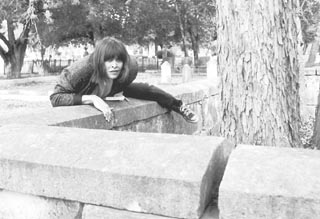Exhibitionism
Fri., Dec. 11, 1998
THE SANTALAND DIARIES: A LITTLE ELFIN MAGIC
Zachary Scott Theatre Center, through January 3
Running Time: 1 hr, 30 min
 Oh sure, the place looks like nice enough, what with its painted floor of gingerbread boys and girls, its pint-sized snowmen with gentle coal-nugget smiles, its profusion of presents in poinsettia-red wrapping paper nestled snugly in miniature mounds of ever-so-soft artifical snow, its dwarf Christmas trees decked with cuddly beanbag creatures, and its kindergartener-sized peppermint lollipops. Oh, it looks like a Yuletide paradise, all holly-jolly, ho-ho-ho, good-will-toward-men-and-to-all-a-good-night.
Oh sure, the place looks like nice enough, what with its painted floor of gingerbread boys and girls, its pint-sized snowmen with gentle coal-nugget smiles, its profusion of presents in poinsettia-red wrapping paper nestled snugly in miniature mounds of ever-so-soft artifical snow, its dwarf Christmas trees decked with cuddly beanbag creatures, and its kindergartener-sized peppermint lollipops. Oh, it looks like a Yuletide paradise, all holly-jolly, ho-ho-ho, good-will-toward-men-and-to-all-a-good-night.
But as anyone who's crossed the threshold of a mall between dawn the day after Thanksgiving and midnight the day before Christmas knows, Santaland is really Holiday Hell. The pit of perdition. The domain of the damned. Wherever there are children and adults waiting in line to visit a bearded man in a red suit, you'll find more human misery, more tribulation, more pettiness, malice, and gnashing of teeth per square inch than any spot outside the lake of fire.
And writer David Sedaris has seen all of it. He spent a "season of giving" in the employ of Macy's department store, working as an Elf in the New York City store's Santaland, and his journal of that experience records all the snubs, the tantrums, the confrontations, the insults, and the threats that seem to go with the fake-snowy territory -- as well as the pure absurdity of doing the nine-to-five thing in a belled cap and pointed slippers -- in vivid and mordant detail. The Diaries hilariously lays waste to the commercial blitzkrieg in the name of Christmas and all those bigots, backbiters, and blowhards who bully their way through the holiday throngs without a clue as to the season's true meaning.
Now, Sedaris' sardonic saga is being played out on the Zachary Scott Theatre Center stage. To those familiar with The Santaland Diaries through print or Sedaris' own recorded version on National Public Radio, this production might seem superfluous; what could a theatrical adaptation add to the delights of the originals? Well, mostly a delicious kind of immediacy. Heyd Fontenot's visions-of-sugar-plums set plunks us right in the middle of that off-key fairyland in which Sedaris' elf-self "Crumpet" must toil; it has the holiday display thing down pat, walking that fine line between cute and cloying. Seeing Martin Burke schlep around in the Santaland "work clothes" -- his pointy cap smooshing his ears outward, his neck encircled by a star-shaped scarlet collar with a jingling bell on every point, his shoes curling comically upward at the toes -- reinforces how ludicrous a job this man has taken. And being in Burke's presence as he relates the insanity he encounters there fosters an intimacy about the stories that makes us feel like we're getting them firsthand, pal to pal. And that proximity also just ratchets the hilarity up a couple of notches.
Burke may only be playing an elf, but there is real magic in his performance. He handles Sedaris' trenchant commentary like an expert knife-thrower, casually fingering some pointed observation or other, then deftly flicking it off to land -- thwack! -- in the heart of the target. He has an affinity for the drollness of Sedaris' style and can serve up this material as dryly as the author himself, but Burke's own manner is more lively, and most of the time he uses it to tell Sedaris' story, zipping across the set, gesturing emphatically, reacting with grand displays of frustration and indignance and waggishness. He animates the Diaries, filling them with motion and passion, so that they provide us with a giddy holiday whirl.
In the Zach production, it takes a good 40 minutes to get to the Diaries proper, but they are indeed a good 40 minutes. Director Dave Steakley fills them with a tasty party mix of holiday-themed short works. Opening with a jolly jab at his own work on the Kleberg stage this year, Steakley has Burke appear in a white robe and small gauze wings to sing Kander & Ebb's "I'm Gonna Be an Angel." That becomes the jumping-off point for Meredith Robertson to deliver Sedaris' "Front Row Center," a spoof of caustic critics in which a John Simon wannabe pans holiday pageants at elementary schools. It's a wicked little piece, ripe with clever but malicious verbal stabs, and Robertson, her voice whittled to a cutting edge, dexterously declaims them so that they slice, slice, slice. On a lighter note, Robertson also favors us with a sultry rendition of "Santa Baby" (reminding us again of her versatility and skill as a singer) and a fiery version of the parody number "Surabaya Santa," in which a fed-up Mrs. Kringle sings a "Dear Kris" letter to her inattentive hubby in the style of a moody old Brecht-Weill number. Robertson does her star turn of the evening with this latter piece, handily getting the song to work on every level: as holiday joke, as vocal showpiece, and even as Brechtian parody. It's dazzling and hilarious, as is another Sedaris piece, "Dinah," performed by Burke. The tale of a sullen brother who comes to see the sister he despises with new eyes after he joins her on an errand of mercy, "Dinah" is a joyride of a story, one that heads in unexpected directions, that careers around corners and cuts across yards. Burke guns its engine, savoring every mad turn and loopy character, especially Dinah, a cafeteria worker who's also a lush and a hooker. He takes a moment in which she boozily attempts to light a cigarette in the back seat of a moving station wagon (and misses and ... misses and ... drops it on the floor) and delivers it with such timing and flair that it is comedy sublime.
It's clear that Steakley, Burke, and Robertson, all of whom devoted the past year to Angels in America, are blowing off steam here, unwinding, cutting loose. But what a way they're doing it: with razor wit and style and a vivacious spirit that's infectious. David Sedaris may not have found much of the spirit of the season at Santaland, but this team of Austin artists have turned it into a place that overflows with good cheer. -- Robert Faires
GOIN' TO GEORGIA: LIGHT IN OUR LIVES
Planet Theatre, through December 20
Running time: 1 hr

A single chair in a pool of light denotes the realm of the solo performer. From this minimal setting issues forth the detailed, intimate narrative: Fond recollections and personal memories that the solo artist crafts into a universal tale. She shares with her audience her coming of age: moments of youthful pain and infinitesimal triumphs that, as she speaks, become our own memories, our own experiences. She is the prism through which we might shine the light of our own lives; through her grounded storytelling, we might all refract a similar fan of resplendent colors.
It is too bad, then, that Goin' to Georgia, an often poignant, occasionally funny reminiscence, written and performed by Joy Cunningham, doesn't consistently allow for the colorful beauty for which her words seem to strive. Perhaps Cunningham was off her rhythm on the night this reviewer attended (she won Best of Fest with this piece at 1997's FronteraFest, so one ought not doubt its quality); she frequently stumbled over her text, miscued details of the physicality of her various characters, and in general lacked a certain clarity of storytelling that keeps everyone in the same shared moment. (It should be noted that a number of interruptions by late arrivals to the theatre might have affected the flow for performer and audience alike.) Clearly something was missing.
Goin' to Georgia is Cunningham's sometimes poetic, sometimes disjointed recollection of her family's annual road trip to Grandma's. Grueling in its own right, this particular trip takes place when Cunningham is a 10-year-old beginning to recognize the first drops of her impending journey to womanhood -- raindrops that will become a scything Georgia shower in no time at all. The actress populates her memoir with her just-this-side-of-sane, yet strangely familiar, family members. There is her Southern belle mother, conservative father, gay elder brother, Alzheimer's-beset grandmother, and other relatives and neighbors of a small town in Georgia that most folks would drive on by, not realizing how closely the lives of this odd collection of characters parallels the lives of those hurrying past.
Costumed in an overly large peach shirt and rather short peach pants with clashing red Keds, Cunningham looks more like a hospital orderly than the gawky 10-year-old protagonist of her memory. Although there is a chair that sits in a pool of light, there are also several platforms at various levels denoting different places from the story: Grandma's kitchen, the kitchen of the wicked aunt, a pier. Director Dora Lanier has Cunningham make use of each in turn, as well as rush about the Planet Theatre stage floor, a distracting and needless sense of naturalism that impedes the storytelling and causes Cunningham to lapse in focus when she'd be better off sitting or standing still. A misguided direction to show in mime a variety of described activities -- the unloading of a refrigerator, her father at the steering wheel of the family car, the spilling of a chocolate malted, a boy on a swing -- further removes the audience from the storyteller's potent immediacy. Lastly, Jon A. Smith's lighting, often leaving the actress in the dark, seems motivated by the same misplaced concern for realism: Window gobos for Grandma's house and oddly timed changes of atmosphere interfere when a simple highlight works a simpler magic.
When Cunningham does sit still in chair and pool of light, freed from the unnecessary trappings surrounding her, her storytelling flows with force and compassion. The show's finale, where she tenderly recalls her erstwhile dysfunctional family retiring to Grandma's porch after a huge and hearty meal, the crickets and bullfrogs filling in the monumental gaps in conversation, is as lovely a moment of theatre as you're likely to see, feel, and hear -- one which makes you think that, indeed, her story is yours. -- Robi Polgar








